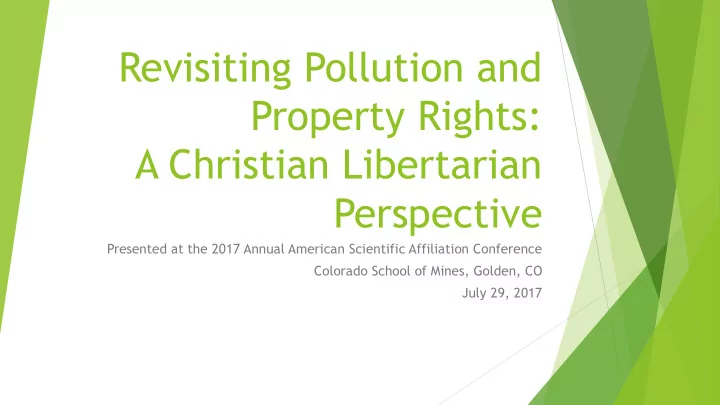

Revisiting Pollution and Property Rights: A Christian Libertarian Perspective Presented at the 2017 Annual American Scientific Affiliation Conference Colorado School of Mines, Golden, CO July 29, 2017
Points of Departure 1. Complexity Theory 1. A few laws can do…a lot! 2. True in physics, chemistry, biology — but also economies and societies. 3. “Accidental” benefits in complex systems (e.g., bees don’t know their vomit is so tasty and nutritious for me…) 2. Argument: Same principles apply to property rights and environmental protection 1. Few simple laws can do…a lot! 2. “Incidental benefit” of this is extremely effective for environmental protection
Today’s Orthodox Narrative Liberty results in excessive environmental destruction Common law and property rights inadequate to protect environment Global, coercive regulatory agencies only way to adequately solve problem Without such, we’d all be…swimming in tar.
An Alternative Narrative Principle basis: non-aggression and liberty. “Everyone is free to do what they wish with themselves and their property, so long as they don’t violate others or their property, for it is illegitimate to initiate force or fraud against a person or their property.” Environmental goods are produced and protected best under this arrangement. Common law Property rights: e.g., trespass and nuisance laws (later, riparian laws). Instrument of justice: injunction and/or damages for plaintiff. Very effective in European history and in US and Canada, for centuries . Pollution cases can (and were) taken to court, not to legislature/feds.
Failures Abroad During Hey-Day of Industrialism? Causes for failure: 1. Lack of ownership of many resources/properties. 1. People didn’t “know their rights” or the law (much like today). 2. Pollution was not viewed the same as today; often misattributed causes 3. (others’ “intemperance”?) Pollution was viewed as “necessary cost” of “progress.” 4. People wanted to keep their jobs; complaining was antagonistic. 5. Litigation was often expensive and complicated. 6. Most (if not all) of these reasons do not amount to a fundamental 2. deficiency in common law. (Earlier evolution of riparian rights would have helped, however).
Transformation of Law: “Public Good” Rules Over “Private Interest” Polluters took control of government machinery Legislatures overran court authority in favor of crony-capitalists. Individuals now powerless to stop or defend against mass-pollution 1850-1950 was transformative years in Canada and UK especially (US varies by state/city) All Part of Larger Modern Collectivist Theory (incarnated in 20 th century socialist experiments) The Legal Shift Contrasted: Blackstone (1700s): “So great…is the regard of the law for private property that it will not authorize the least violation of it; no, not even for the general good of the whole community.” Hole vs. Barlow (1858): “Private convenience must yield to public necessity.”
But Why is Common Law and Property Rights Still a More Viable Option? Four Reasons: 1. Simple and Efficient Design 2. Economically Sound 3. Ethical 4. Genuinely Effective
1: Simple and Efficient Design Conceptually simple (e.g., ‘don’t commit violence’) 1. Intuitive (what is “mine,” and exchange, hardly needs to be taught) 2. Conceptually integrated (already built-in to ethical system, law system, 3. and existing institutions; non-disruptive). Protection of environment is automatic . Few Processes and Intermediaries (only courts; no layers of bureaucracy; 4. no political apparatus, voting process, etc.) No potential/actual overhaul/suspensions each election cycle (e.g., 5. competition of endless executive orders) Minimal Guesswork (‘price’ of land, pollution, affects on property, what 6. constitutes ‘public good’ or ‘societal benefit’)
2: Economically-Sound Obeys laws of supply and demand (challenging them can’t work!) 1. Real prices are reflected in cost of pollution, environmental goods, 2. and value of land/property-which reflect real supply and demand. Honors incentives (polluters compelled to be clean; landowners 3. compelled to resist/challenge pollution) Avoids “Tragedy of Commons” Principle; ownership Protects 4. Higher incomes lead to higher demand in environmental goods. 5. Allows for rapid development of technology and innovation — 6. necessary for protecting environment. Thus, natural (instead of premature) growth of technology, 7. innovation, and capacity of implementation.
#3 Ethical 1. Fair 1. Not biased towards wealthy or poor; all are “equal under the law.” 2. Polluters pay for their pollution, not taxpayers. 3. Immune to political trends or changing utopian ideals. 4. Immune to crony-capitalism (courts are harder to bribe than politicians!) 5. Immune towards other bribes (e.g., scientists often get research funding by scaring public and distorting the real pictures). 2. Nonviolent 1. The only coercion that takes place is for those who have already initiated coercion. 2. Thus, avoids dichotomy between rulers and obedient servants; community is shaped by mutuality instead of unidirectional violence.
#4 Effective 1. Rigorous Standards (pollution is illegal by default ) 2. Proven track-record in hundreds of court cases and situations, adapted to the specific conditions of each. 3. Proven ally for conservation and environmentalists (more can be – and has been - accomplished through courts than congress and regulation). 4. Results are inherently mutual and satisfactory; projects and transactions don’t happen otherwise. 5. Can effectively adapt to changing circumstances (e.g., riparian law).
Recommend
More recommend